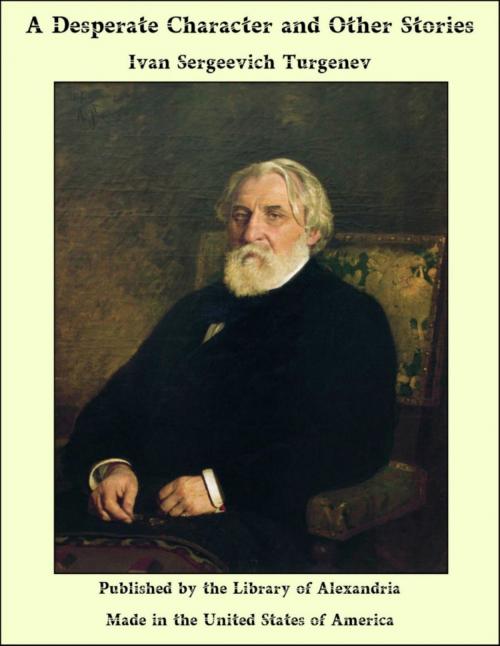A Desperate Character and Other Stories
Nonfiction, Religion & Spirituality, New Age, History, Fiction & Literature| Author: | Ivan Sergeevich Turgenev | ISBN: | 9781465589576 |
| Publisher: | Library of Alexandria | Publication: | March 8, 2015 |
| Imprint: | Language: | English |
| Author: | Ivan Sergeevich Turgenev |
| ISBN: | 9781465589576 |
| Publisher: | Library of Alexandria |
| Publication: | March 8, 2015 |
| Imprint: | |
| Language: | English |
We have said that the lack of will in the Russian nature is at the root of Russian virtues and vices, and in this connection it is curious to remark that a race's soul seems often to grow out of the race's aspiration towards what it is not in life. Is not the French intellect, for example, so cool, clear-headed, so delicately analytic of its own motives, that through the principle of counterpoise it strives to lose itself and release itself in continual rhetoric and emotional positions? Is not the German mind so alive to the material facts of life, to the necessity of getting hold of concrete advantages in life, and of not letting them go, that it deliberately slackens the bent bow, and plunges itself and relaxes itself in floods of abstractions, and idealisations, and dreams of sentimentality? Assuredly it is because the Russian is so inwardly discontented with his own actions that he is such a keen and incisive critic of everything false and exaggerated, that he despises all French rhetoric and German sentimentalism. And in this sense it is that the Russian's lack of will comes in to deepen his soul. He surrenders himself thereby to the universe, and, as do the Asiatics, does not let the tiny shadow of his fate, dark though it may be, shut out the universe so thoroughly from his consciousness, as does the aggressive struggling will-power of the Western man striving to let his individuality have full play. The Russian's attitude may indeed be compared to a bowl which catches and sustains what life brings it; and the Western man's to a bowl inverted to ward off what drops from the impassive skies. The mental attitude of the Russian peasant indeed implies that in blood he is nearer akin to the Asiatics than Russian ethnologists have wished to allow. Certainly in the inner life of thought, intellectually, morally, and emotionally, he is a half-way house between the Western and Eastern races, just as geographically he spreads over the two continents. By natural law his destiny calls him towards the East. Should he one day spread his rule further and further among the Asiatics and hold the keys of an immense Asiatic empire, well! future English philosophers may feel thereat a curious fatalistic satisfaction.
We have said that the lack of will in the Russian nature is at the root of Russian virtues and vices, and in this connection it is curious to remark that a race's soul seems often to grow out of the race's aspiration towards what it is not in life. Is not the French intellect, for example, so cool, clear-headed, so delicately analytic of its own motives, that through the principle of counterpoise it strives to lose itself and release itself in continual rhetoric and emotional positions? Is not the German mind so alive to the material facts of life, to the necessity of getting hold of concrete advantages in life, and of not letting them go, that it deliberately slackens the bent bow, and plunges itself and relaxes itself in floods of abstractions, and idealisations, and dreams of sentimentality? Assuredly it is because the Russian is so inwardly discontented with his own actions that he is such a keen and incisive critic of everything false and exaggerated, that he despises all French rhetoric and German sentimentalism. And in this sense it is that the Russian's lack of will comes in to deepen his soul. He surrenders himself thereby to the universe, and, as do the Asiatics, does not let the tiny shadow of his fate, dark though it may be, shut out the universe so thoroughly from his consciousness, as does the aggressive struggling will-power of the Western man striving to let his individuality have full play. The Russian's attitude may indeed be compared to a bowl which catches and sustains what life brings it; and the Western man's to a bowl inverted to ward off what drops from the impassive skies. The mental attitude of the Russian peasant indeed implies that in blood he is nearer akin to the Asiatics than Russian ethnologists have wished to allow. Certainly in the inner life of thought, intellectually, morally, and emotionally, he is a half-way house between the Western and Eastern races, just as geographically he spreads over the two continents. By natural law his destiny calls him towards the East. Should he one day spread his rule further and further among the Asiatics and hold the keys of an immense Asiatic empire, well! future English philosophers may feel thereat a curious fatalistic satisfaction.















